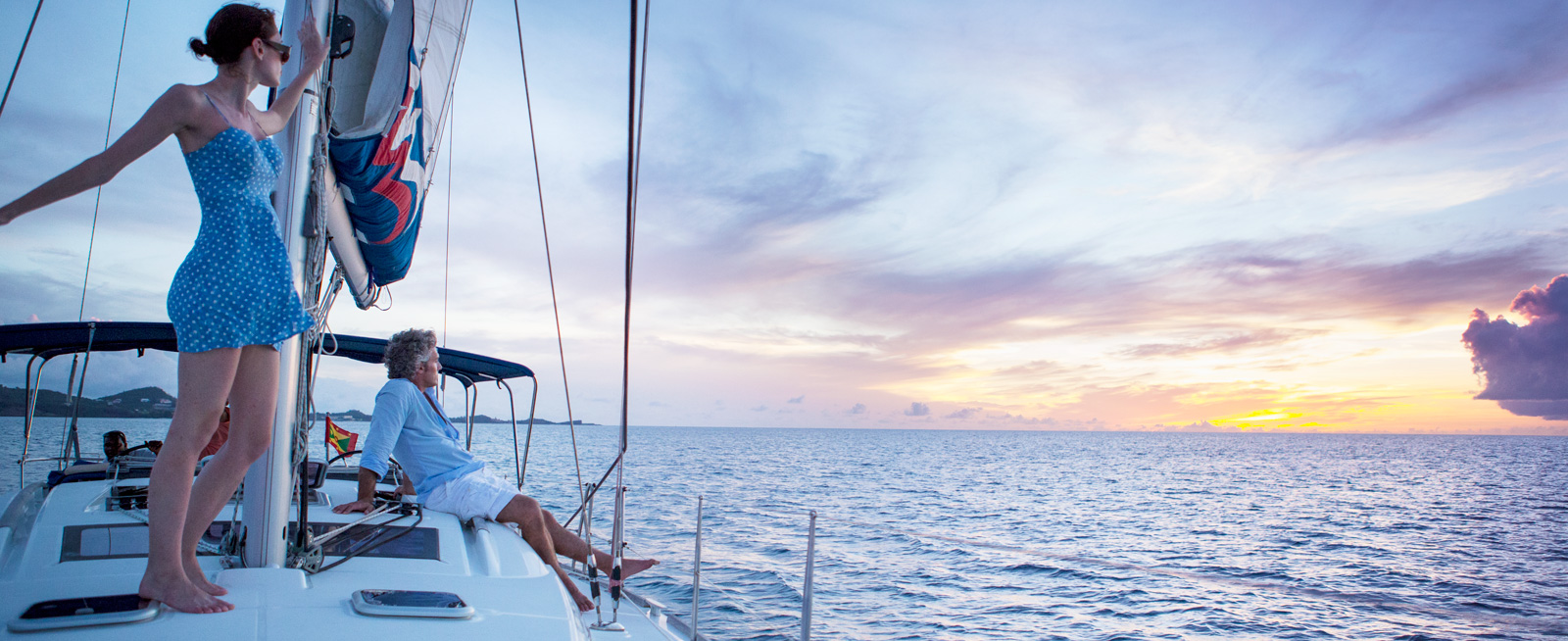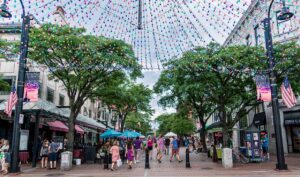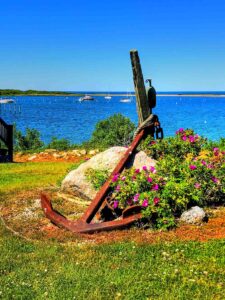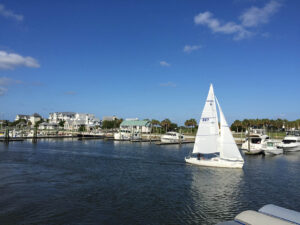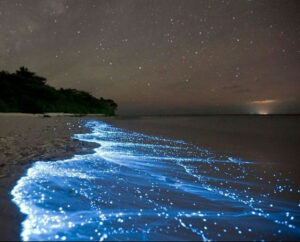Just mentioning “the Windward Islands” to a sailor conjures up romantic visions under sail in the West Indies portrayed in Patrick O’Brian’s Aubrey-Maturin novels. The Windward Islands extend like stepping stones some 170 nautical miles in an arc from north to south in the Lesser Antilles.
My first experience sailing the Windwards was in 1992, and that was a beat from St. Lucia to Martinique, or “Matnik” as my Lucian friends called it in their creole patois. With 25-knot winds off the bow, under a doublereefed main and genoa, we pounded to windward for three and a half hours in 4- to 6-foot seas. I thought there must be a better way to cruise the Windwards, and there is. With the prevailing northeasterly trade winds, starting a cruise in Martinique and heading south gives spirited broad reaches on the passages between the islands and easy reaches on the protected leeward side of the major volcanic islands in this chain.
The Windward Islands are an ideal charter sailing destination for more experienced sailors, with 7 to 10-day “one way” charters from Martinique to Grenada being very popular. A one way charter offers the opportunity to expand your cruising range without having to double back to the boat’s original departure point at the end of the charter.
Martinique
This French overseas state is the largest island of the Windwards, and its political status is the same as Hawaii is to the continental United States. Fortunately, its links to Paris give it enough of a continental flair to find excellent croissant and cafe au lait when going ashore for breakfast. Special French bread flour is flown in daily via Air France to produce a crusty baguette, which can be tucked nicely under your arm while motoring back in the dinghy to your yacht at anchor.
St. Pierre at the northern end of the island was the hub of culture, commerce and fashion during the French colonial period. Then in May 1902, the nearby volcano Mt. Pelee erupted destroyed the city and its 30,000 inhabitants. Although there are no marinas in St. Pierre, the open roadstead is an excellent anchorage as long as there are no northerly swells.
Sailing south the imposing 17th-century Fort St. Louis protects Fort de France, the island’s capital. Across the large bay from the fort is Trois Ilets, the birthplace of Napoleon’s Empress Josephine. The Windward Islands have a dearth of marinas, but abound in beautiful anchorages, and Martinique follows that rule. In the waters near Fort de France, transient dock space is available at the Marina de la Pointe du Bout by Anse Mitan. The Marina du Marin farther south at Le Marin is the largest marina on the island and offers extensive services.
Before shaping course for St. Lucia, the next island south along the Windward chain, anchoring off the village of Sainte Anne is a must. Visiting this quaint resort town with a square surrounded by small shops and French restaurants with a Caribbean flavor is delightful.
St. Lucia
From the moment that St. Lucia reverted to a French Crown colony during the reign of Louis XIV in 1674 until the end of the Napoleonic era, St. Lucia was declared a neutral territory or changed hands between the British and French no fewer than 11 times. St. Lucia was a pawn in the affairs and wars of the European powers during that period. The treaties that ended the War of Austrian Succession, the Seven Years War and the American War of Independence all played roles in the ever-changing ownership of St. Lucia. Finally, in 1814, Great Britain gained permanent possession of St. Lucia and didn’t relinquish it until 1979, when St. Lucia was granted independence.
Today, St. Lucia is a vibrant island that hosts the St. Lucia Jazz Festival every spring. The northwest corner of this island is home to Island Global Yachting’s Rodney Bay Marina, a premier superyacht destination on the island. This well-known marina is complete with restaurants, shops and a full service boatyard.
Sailing south along the leeward side of St. Lucia are the twin Pitons,Gros and Petit, on arguably the most stunning landscape in the Eastern Caribbean. The Pitons are the remains of an eroded ancient caldera, with active sulphur fumaroles and hot springs in between. The nearby village on the bay was named Soufriere, literally meaning “sulphur in the air.” This town was laid out in classic French European style, with a church adjoining a square, and the square surrounded by homes of the wealthy inhabitants.
St. Vincent
Dinghying ashore at Wallilabou Bay 20 years ago was my first experience with a Rastaman farmer after hiking inland a couple of miles through a landscape of hills and small hummocks covered wish lush tropical plants, palm trees and bamboo. With a mountainous rainforest in the distance, the island appeared to be a film director’s version of a proper jungle paradise. When I rounded a bend in the trail, I came across an aging farmer with graying dreadlocks tending his half-acre plot of ganja. For me, St. Vincent has always had an untamed quality with a live-and- let-live attitude. Wallilabou Bay today, is best known for being transformed into the movie set of old Port Royal, Jamaica for the first “Pirates of the Caribbean” film.
Dotted with a limited number of small anchorages on the Caribbean side of the island, most cruisers sailing to St. Vincent head to Young Island Cut at the southern tip to look for dock space. The Blue Lagoon just east of the cut is home to Lagoon Marina, a pleasant little marina with stern-to dockage.
The Grenadines
St. Vincent is the seat of government of the country officially known as St. Vincent and the Grenadines. The Grenadines constitute a dozen and a half or so small islands with a multitude of anchorages, each of which could easily be dubbed “paradise.” Choosing a favorite island in the Grenadines depends one’s mood, much like selecting flavors to scoop on an ice cream cone.
Mustique is the most well known island of this group, owing to the clever marketing of Lord Glenconner, who developed the island in the 1960s. Princess Margaret of Great Britain and other “jet setters” of the day made it their winter tropical destination of choice. Just about every sailor you talk to has a story of meeting Mick Jagger in Basil’s Bar, the iconic restaurant on the island. And the only anchorageon the island is just off Basil’s Bar in Britannia Bay, so you can even enjoy live music from your yacht.
This island is dotted with gorgeous villas like Yemanja House, Plantation House, and Toucan Hill — but very few hotels. The most well-known hotel is Cotton House, and Tuesday evening cocktails are an island ritual. Golf carts are the transportation of choice to get to the many beautiful beaches on Mustique.
Mayreau with its sandy beaches and half-moonshaped Salt Whistle Bay at the northern tip of the island is always a popular anchorage. A leisurely hike from the beach up the hill will reward you with spectacular views of the surrounding sea and nearby islands.
Tobago Cays is the reason most sailors cruise the Grenadines. It is a group of four deserted islands, with pristine clear water protected from the Atlantic Ocean swells to windward by Horseshoe Reef.
Petit St. Vincent, or PSV for short, is a private island resort with a splendid anchorage. Yachtsmen are welcomed ashore for dinner in a secluded romantic atmosphere.
Carriacou is politically part of Grenada, not St. Vincent, even though geographically it is in the Grenadine chain. Tyrell Bay is a deep and well-protected anchorage with local boat boys who harvest mangrove oysters nearby. Just before sunset, they will come to your boat selling them by the dozen and will shuck them for you. Make sure you have some slices of lime ready!
Grenada
Known as the “Isle of Spice,” Grenada is famous for its nutmeg, so much so that the nutmeg is depicted on the national flag. This rugged and mountainous island is very picturesque and has a few waterfalls well worth visiting. My favorite Friday night activity is jump-up in Grenville on the windward side of the island. The whole town gets into the spirit of partying with plenty of rum and dancing in the streets.
St. George’s is the prettiest capital of any island nation in the eastern Caribbean. The Carenage, St. George’s old port, was the destination of inter-island schooners and small cargo vessels. Port Louis Marina near the Carenage is a new facility, which will dock yachts up to 300 feet LOA. Grenada Boatyard/Marine is a one-stop boatyard providing quality services in storage, repair and maintenance. It is located along the southeast coast at St. David’s Harbour.
The Moorings – offers charters from their base in Grenada and St. Lucia. Nicknamed “The Spice Isle,” Grenada is known for its bustling Market Square, historic forts, spice plantations, rum distilleries, and colorful coral gardens. A Grenada charter can also begin from their base in St. Lucia, opening the door to explore other equally enchanting islands along the way. Another jewel of the Windward Islands, St. Lucia boasts a landscape expansive in banana plantations, picturesque hamlets and beautiful harbors reminiscent of an older Caribbean. Opt to sail one of these destinations or do a one-way charter from St. Lucia to Grenada to get the best of both worlds. Marinalife Cruising Club Members receive 5% off charters!
Capt. Jeff Werner has been in the yachting industry for over 25 years. In addition to working as a captain on private and charter yachts, both sail and power, he is a certified instructor for the USCG, US Sailing, RYA and the MCA. He is also the Diesel Doctor, helping to keep your yacht’s fuel in optimal condition for peak performance. For more information, call 239-246-6810, or visit MyDieselDoctor.com. All Marinalife members receive a 10% discount on purchases of equipment, products and supplies from Diesel Doctor.


